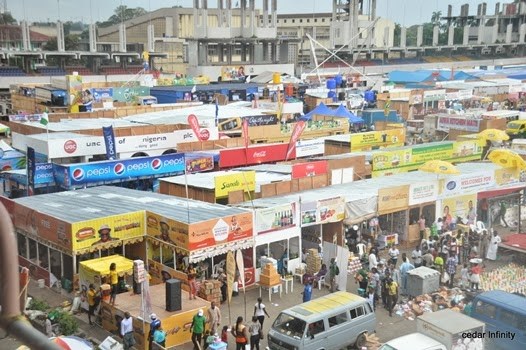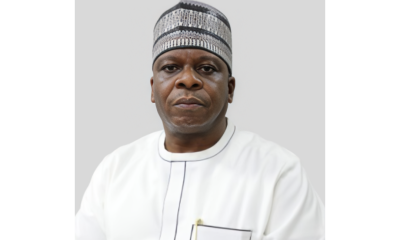Economy
Understanding The Oil Subsidy Quagmire

By Madaki O. Ameh
The subsidy regime is so shrouded in opaqueness that it is difficult to explain it intelligibly to anyone.
But simply put, the government alleged that for every litre of PMS purchased at the pump price of N195/litre which was the last operating pump price before the recent jerk up of the prices, the government was paying the importers of the product the difference between the cost of producing that one litre in the foreign refineries and all the related costs (shipping, margins, handling costs, taxes, etc.
) which makes up the landing cost, and the price that the end users have to pay for the product at the pump in different parts of the country.In addition to that differential, there is also the cost of bridging, which is the cost of transportation of the product from the ports of discharge in Lagos and Port Harcourt, to far flung places, so that the products can be sold at the same price throughout the country.
A really idiotic policy I must say, but that has been in operation since 1975! That was the sole role of the Petroleum Equilization Fund (PEF), which has now been subsumed into the Nigerian Midstream and Downstream Petroleum Regulatory Agency (NMDPRA) under the PIA.
No one seems to know how much PMS is consumed in Nigeria daily, so the figures keep fluctuating depending on who is in charge of the process at any point in time in NNPC and the other Regulatory Agencies.
And the fluctuations can be anything between 30 million litres a day to 100 million litres a day! Since a subsidy of at least N300/litre was claimed to exist on each litre of PMS, you can imagine the level of fraud if you multiply that figure by the total daily consumption claimed, and the actual daily consumption.
The more the fraudsters got greedy, the higher the alleged daily consumption on the basis of which subsidy was paid. And this went on for decades on end!
Then, there is another dimension to it – DSDP program. The Direct Sales, Direct Purchase program was designed to be a swap, trade by barter scenario, where crude oil was swapped for the equivalent in PMS with foreign refineries (15 in the consortium) who were required to ship the finished products to Nigeria in exchange for the crude oil they got, since our refineries are always in a state of being perpetually turned around. This was introduced in 2017 and operated until a few weeks ago, when NNPC announced that they had scraped it .
In a transparent environment, there should be no claim of subsidy in this arrangement, because what you get in the quantity of PMS from the consortium is supposed to be equivalent to the value of crude oil shipped to the consortium under the swap arrangements.
Like all things Nigerian, NNPC still claims to have been paying subsidies (or making under recoveries) in respect of the same PMS, whereas there is supposed to be a zero impact in cash terms. Up till this moment, NNPC has not revealed who they have been paying this subsidy to, fuelling the outrage that a few people have been feeding fat on this fraud.
Another interesting dimension to all this is alleged smuggling of refined products across our ever porous borders. The government alleges that our subsidized PMS supplies all neighbouring countries because the Customs, Immigration and other security agencies at the borders cannot effectively checkmate the smugglers who sell the products at a high premium, and so stopping the subsidies would increase the domestic prices of the products and make smuggling unattractive. If there was ever an idiotic argument, this is certainly at the very top!
How do you punish an entire populace because of the ineffectiveness of your own security agencies paid with tax payers money and holding no one accountable?
The full ramifications of this fraud cannot be unravelled without a wholesale, honest and transparent probe of the activities of NNPC and all the Regulatory Agencies associated with this, including CBN and Ministry of Finance.
Like all Nigerian probes, once the National Assembly gets involved, their sole interest is to plug into the drainpipe and scuttle the outcomes, and this has been happening since 2012 when the first such probe was launched during Jonathan’s regime.
Chief Madaki O. Ameh, Managing Partner, BBH Consulting, writes from Abuja.
Economy
Trade Tensions: Global Economy Stands at Fragile Turning Point -UN

The UN Department of Economic and Social Affairs (UN DESA) has said that the global economy stands at a fragile turning point amid escalating trade tensions and growing policy uncertainties.UN DESA, in a report published on Thursday, stated that tariff-driven price pressures were adding to inflation risks, leaving trade-dependent economies particularly vulnerable.
It stated that higher tariffs and shifting trade policies were threatening to disrupt global supply chains, raise production costs, and delay key investment decisions – all of this weakening the prospects for global growth. The economic slowdown is widespread, affecting both developed and developing economies around the world, according to the report.For instance, in the United States, growth is projected to slow “significantly”, as higher tariffs and policy uncertainty are expected to weigh on private investment and consumer spending.Several major developing economies, including Brazil and Mexico, are also experiencing downward revisions in their growth forecasts.China’s economy is expected to grow by 4.6 per cent this year, down from 5.0 per cent in 2024. This slowdown reflects a weakening in consumer confidence, disruptions in export-driven manufacturing, and ongoing challenges in the Chinese property sector.By early 2025, inflation had exceeded pre-pandemic averages in two-thirds of countries worldwide, with more than 20 developing economies experiencing double-digit inflation rates.This comes despite global headline inflation easing between 2023 and 2024.Food inflation remained especially high in Africa, and in South and Western Asia, averaging above six per cent. This continues to hit low-income households hardest.Rising trade barriers and climate-related shocks are further driving up inflation, highlighting the urgent need for coordinated policies to stabilise prices and protect the most vulnerable populations.“The tariff shock risks hitting vulnerable developing countries hard,” Li Junhua, UN Under-Secretary-General for Economic and Social Affairs, said in a statement.As central banks try to balance the need to control inflation with efforts to support weakening economies, many governments – particularly in developing countries – have limited fiscal space. This makes it more difficult for them to respond effectively to the economic slowdown.For many developing countries, this challenging economic outlook threatens efforts to create jobs, reduce poverty, and tackle inequality, the report underlines. (NAN)Economy
FG To Finalize N1.5trn Road Concession Project- Edun

The Minister of Finance and Coordinating Minister of the Economy, Mr Wale Edun, says the Federal Government will soon finalise N1.5 trillion road concession project.
Edun made the statement during a meeting with some private sector investors in Abuja on Wednesday.
He said that the government was on the verge of finalising the landmark N1.
5 trillion road concession project, launched in 2021 under the Highway Development and Management Initiative (HDMI).The minister said that the initiative aimed to involve private sector partners in the reconstruction and management of nine major highways across the country, spanning approximately 900 kilometers.
He said that the partners had almost completed all arrangements for the highways, which they would finance, rebuild, and maintain under 25-years concession agreements.
Edun said that the concessionaires were expected to recoup their investments through tolling fees.
“We met the concessionaires who have virtually concluded all the agreement arrangements for nine roads, nine major highways, which they are contracting to refinance the rebuilding of and to recover their funds from tolling fees under 25-year or so agreements.
“And we met them to iron out the remaining administrative obstacles for the kicking off construction of these roads,” he said.
Edun said that the substantial private sector investment would bridge budgetary gaps.
He added that it would also allow investors to undertake revenue-generating projects, leveraging their expertise and resources for long-term implementation and maintenance.
“Thereafter, it will be a question of signing the addendums and moving to the site.
“As you know, already the 125-kilometer Benin–Asaba Highway concession agreement has been signed. The addendum has been signed.
“All arrangements have been finalised, in fact, the ministry of works have handed over the road to the concessionaires.
“They have already started the preliminary arrangements for reconstruction of that road in place of a 10 lane highway.
“It is an investment, it’s a project and an initiative that will reduce the travel time between Benin and Asaba right up to the Niger Bridge,” the minister said.
Edun said that the Benin–Asaba Highway project, which has already commenced, is expected to reduce travel time between Benin and Asaba from four hours to one hour, significantly enhancing productivity and efficiency in the region.
He described the HDMI, launched in 2021, as a strategic programme by the federal government aimed at attracting private sector investment to improve Nigeria’s federal road network.
Edun said that the initiative seeks to address the challenges of inadequate funding and maintenance by leveraging Public-Private Partnerships (PPP) to develop and manage road infrastructure.
Under the HDMI, 12 highways were initially selected for concession, covering a total of 1,963 kilometers.
These roads include Benin–Asaba, Abuja–Lokoja, Kano–Katsina, Onitsha–Owerri–Aba, Shagamu–Benin, Abuja–Keffi–Akwanga, Kano–Shuari.
Others are Potiskum–Damaturu, Lokoja–Benin, Enugu–Port Harcourt, Ilorin–Jebba, Lagos–Ota–Abeokuta, and Lagos–Badagry–Seme roads.
The minister said that the initiative was projected to generate over 50,000 direct and 200,000 indirect jobs, contributing significantly to the country’s economic growth and development.
The Minister of Works, Engineer David Umahi who joined the meeting virtually reassured the private sector partners on the HDMI of the federal government commitment.
He said that everything possible would be done to resolve the contending issues, adding he will soon be back to address all pending issues.
One of the concessionaires, Mr Kola Karim, representing Shoreline, emphasised the need for right and enforceable documents stipulating the takeoff and handover dates, which would attract investors to invest their funds.
Other private sector partners also requested for the addendum to the original agreement to be signed that would enable toll sections of the completed highways while work was in progress on other sections.
They noted that each concessionaire has unique challenges that should be dealt with accordingly.
Also in the meeting were Minister of Budget and Economic Planning, Abubakar Bagudu, and the Director General Infrastructure Concession and Regulatory Commission (ICRC), Dr Jobson Ewalefoh
Business Analysis
Nigeria Customs Generates over N1.75trn Revenue in 2025
By Joel Oladele, Abuja
The Nigeria Customs Service (NSC) has generated an impressive N1,751,502,252,298.05 in revenue during the first quarter of 2025.
The Comptroller-General (CG) of the Service, Bashir Adeniyi, disclosed this yesterday, during a press briefing in Abuja.
According to Adeniyi, the achievement not only surpasses the quarterly target but also marks a substantial increase compared to the same period last year, reflecting the effectiveness of recent reforms and the dedication of customs officers across the nation.
“This first quarter of 2025 has seen our officers working tirelessly at borders and ports across the nation.
I’m proud to report we’ve made real progress on multiple fronts—from increasing revenue collections to intercepting dangerous shipments,” Adeniyi stated.He attributed this success to the reforms initiated under President Bola Tinubu’s administration and the guidance of the Honourable Minister of Finance and Coordinating Minister of the Economy, Olawale Edun.
The CG noted that the revenue collection for Q1 2025 exceeded the quarterly benchmark of N1,645,000,000,000.00 by N106.5 billion, achieving 106.47% of the target. This performance represents a remarkable 29.96% increase compared to the N1,347,705,251,658.31 collected in Q1 2024.
Adeniyi highlighted the month-by-month growth, noting that January’s collection of N647,880,245,243.67 surpassed its target by 18.12%, while February and March also showed positive trends.
“I’m pleased to report the Service’s revenue collection for Q1 2025 totaled N1,751,502,252,298.05.
“Against our annual target of N6,580,000,000,000.00, the first quarter’s proportional benchmark stood at N1,645,000,000,000.00. I’m proud to announce we’ve exceeded this target by N106.5 billion, achieving 106.47% of our quarterly projection. This outstanding performance represents a substantial 29.96% increase compared to the same period in 2024, where we collected N1,347,705,251,658.31.
“Our month-by-month analysis reveals even more encouraging details of this growth trajectory,” Adeniyi said.
In addition to revenue collection, Adeniyi said the NCS maintained robust anti-smuggling operations, recording 298 seizures with a total Duty Paid Value (DPV) of ₦7,698,557,347.67.
He stated that rice was the most seized commodity, with 135,474 bags intercepted, followed by petroleum products and narcotics.
“From rice to wildlife, these seizures show our targeted approach,” Adeniyi remarked, noting the NCS’s commitment to combating smuggling and protecting national revenue.
Adeniyi also highlighted key initiatives, including the expansion of the B’Odogwu customs clearance platform and the launch of the Authorized Economic Operators Programme, which aims to streamline processes for compliant businesses. The NCS’s Corporate Social Responsibility Programme, “Customs Cares,” was also launched, focusing on education, health, and environmental sustainability.
Despite these achievements, the CG noted that the NCS faced challenges, including exchange rate volatility and non-compliance issues. Adeniyi acknowledged the need for ongoing adaptation and collaboration with stakeholders to address these challenges effectively.
Looking ahead, the NCS aims to continue its modernization efforts and enhance service delivery, ensuring that it remains a critical institution in Nigeria’s economic and security landscape.
“Results speak louder than plans; faster clearances through B’Odogwu, trusted traders in the AEO program, and measurable food price relief from our exemptions. We’ll keep scaling what works,” he concluded.





























